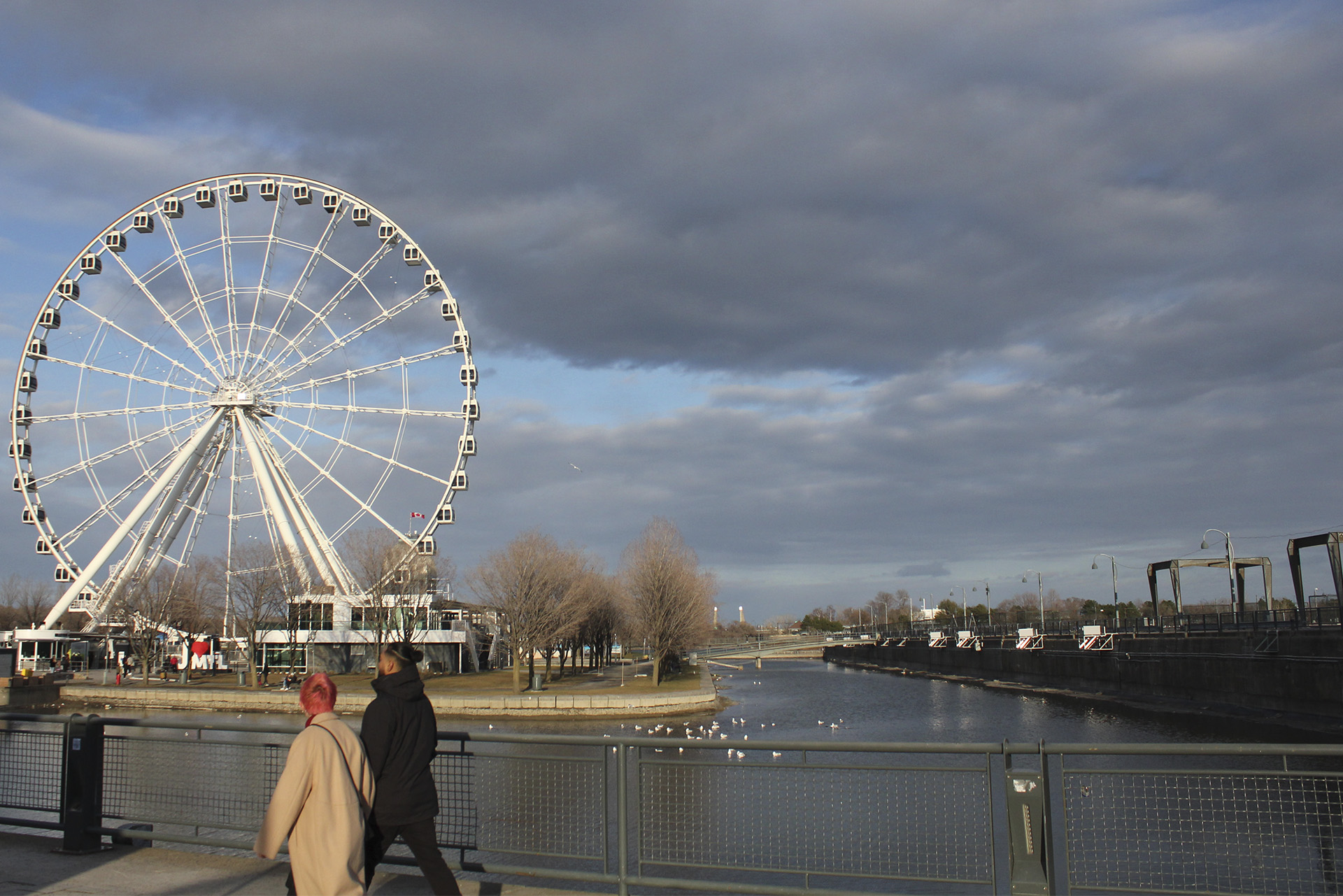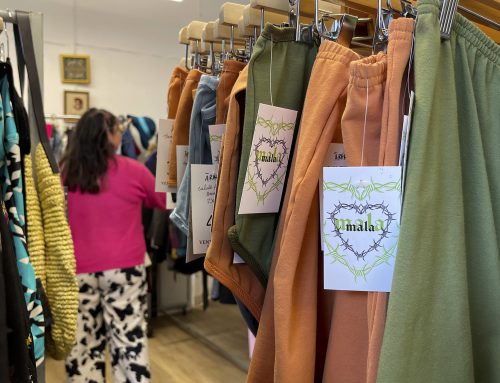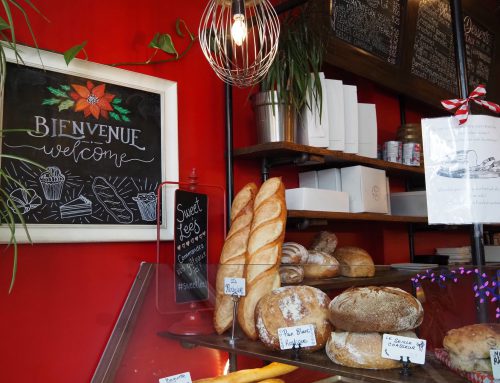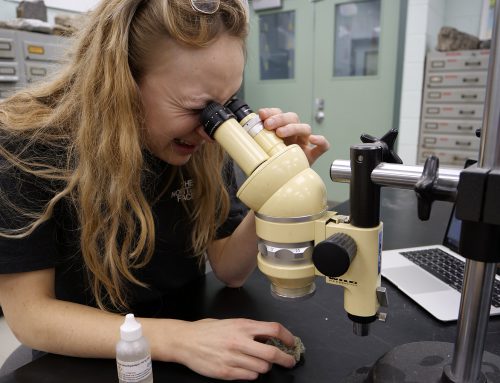BY Marcus Bankuti & Lorenza Mezzapelle
Five minutes from Jean-Talon Market, Resto Los Planes has been serving Salvadorian fare to Petite-Patrie locals for 25 years. For Danny Pavlopoulos, the restaurant was the ideal starting point for a walking tour designed to highlight Montreal food culture that could live up to his company’s promise of “non-touristy tours.”
“There are certain cities you go to for attractions, and there are other cities you go to for the lifestyle, the experience, the vibe of the city,” says the owner of Spade and Palacio tours.
This is the Montreal he and ten tour guides were introducing to 10,000 or more visitors every year. The pandemic changed that.
“We were devastated,” says Pavlopoulos.
He estimates his company did about one per cent of its usual sales last summer. He feels like his business went from being featured in newspapers and travel magazines to being forgotten.
Pavlopoulos believes the tourism industry will rebound in Montreal, but he doesn’t know in what form or how long he will have to wait. He has reached into his personal savings to keep his business afloat, but in spite of his passion for the city, he can’t wait forever.
“If it’s not next year, if it’s not next summer,” he says, referring to 2022, “Then I don’t see myself—there’s only so much you can give at one point, right?”
Before COVID-19, the city was on a roll, attracting a great deal of international attention. In 2019, Montreal led the continent with 92 international association meetings and welcomed more than 11 million tourists, generating nearly $5 billion. Yet, even as the city prepares to reopen, experts say it could be years before tourism comes back.
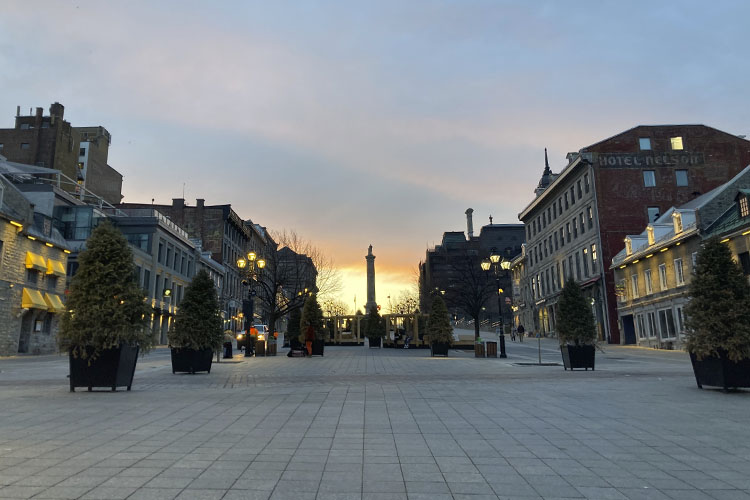
Business owners in Montreal’s old port relied largely on the influx of tourists each year. Photo by Lorenza Mezzapelle.
A survey conducted by the United Nations World Tourism Organization showed only 15 per cent of tourism experts predicting a rebound by 2022, with many choosing 2024. Eve Paré, CEO of the Hotel Association of Greater Montreal, believes the market will resume previous levels in late 2023 or early 2024.
Until that happens, the city’s hotels sit mostly empty, with nearly 80 per cent of hotel workers laid off, according to Paré. Barely 10 per cent of area hotel rooms were occupied as 2021 began, down from more than 50 per cent from a year earlier.
Paré says an internal survey in January 2021 showed a third of HAGM members didn’t expect to last more than six months without additional government support. The following month, more aid for hotels was announced by Quebec, supplementing a patchwork of other funding and credit programs.
The federal government, for its part, extended the Canada Emergency Wage Subsidy and the Canada Emergency Rent Subsidy programs, both of which assist businesses across sectors. The federal government also targets sectors such as tourism and hospitality with the Highly Affected Sectors Credit Availability Program, which began accepting applications in February.
New infusions of cash continue to flow to tourism, with Quebec’s recent budget commiting over $200 million to relaunching the sector and another $200 million going to transportation for tourism.
For many hotels and other businesses, this support is paramount to survival. Paré acknowledges it could take tourism longer to recover than other sectors, but insists maintaining this infrastructure means preserving good jobs and buoying countless businesses once tourists are prepared to return.
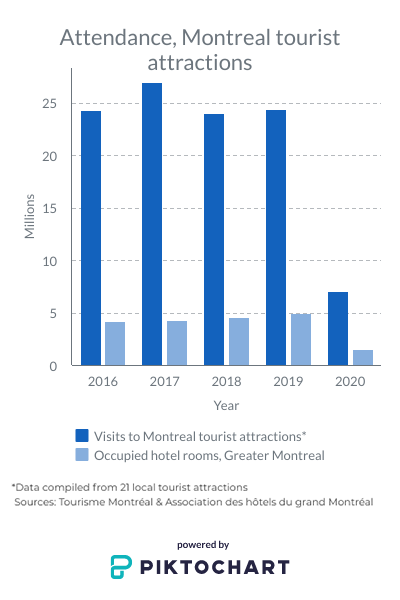
Visits to tourist attractions and hotel occupancy rates both plummeted in 2020. Media by Marcus Bankuti.
“If you don’t have the infrastructure to welcome all those tourists, you won’t be able to benefit from their spending,” says Paré. “So for the economy, it is an important pillar.”
Tourism Montreal, a non-profit whose core mission is to promote the city to an international audience, has responded to the pandemic by pivoting to Quebecers.
“It’s not a very easy job to do, but we are doing this with a lot of information about what to do in Montreal, what to see in Montreal, the museums, the gardens, the parks and so on,” says Manuela Goya. Her organization’s website recently highlighted local sugar shacks as well.
Sugar shacks rely heavily on tourism during the maple season to make profit, leaving many of them bankrupt due to COVID-19. In an effort to stay afloat, the traditional Quebec institutions partnered with grocers around Montreal to deliver takeout meals. Video by Lorenza Mezzapelle.
Struggling tourism businesses are looking for ways to appeal to Quebecers and even Montrealers. This is why Spade and Palacio has chosen to focus on its mural and street art walking tour. It’s completely outdoors, and it has something to offer residents who feel they already know the city well, says Pavlopoulos. Currently, this is the only tour offered by the company.
“I’m not into politics a lot, but I just want to say they do what they can,” says Nicole Madore, owner of Le Magasin Général du Vieux-Montréal.
Madore’s brick and mortar store in Old Montreal has benefitted from government intervention, but she is still relying on her savings to make it through the pandemic.
“It’s a matter of how much I’m willing to lose, and how many more years I’m willing to spend going to work and not making money,” she says. “Maybe I should do like others and just stay home.”
Madore believes Old Montreal is unique, a place where even the city’s residents can go to feel like they’re on vacation for a few hours. However, her business, like others in the neighbourhood, counts on tourists to flourish. She remembers a store full of happy shoppers, but now it’s empty.
“I want to stay open, and I want my store to remain in Old Montreal. That’s where my heart is,” she says.
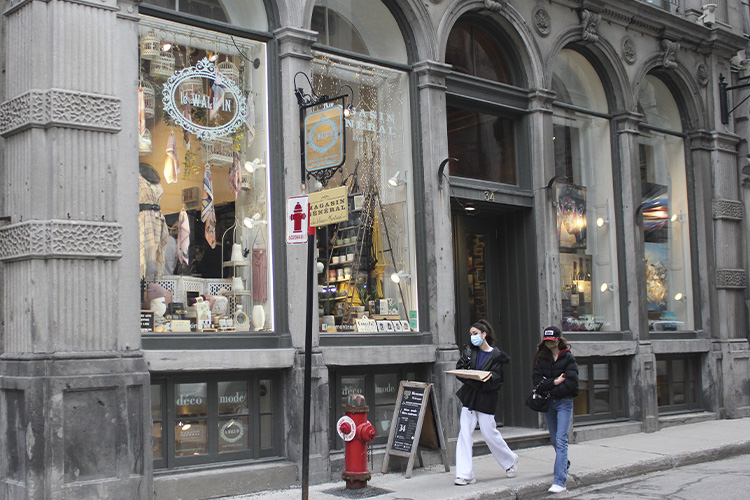
Nicole Madore cannot wait forever for customers to return to Le Magasin General in Old Montreal. Photo by Marcus Bankuti.
Madore is anxious for tourism to return but, at the same time, doesn’t think the government should be too hasty in lifting restrictions given the dangers of the pandemic. “I’m thinking I will be open in 2022, but I don’t know if I will keep on doing this, dreaming it will come back to normal if it never does,” she says.
However, not everyone is convinced the current level of support for businesses is a good idea in the meantime.
“As it is right now, the government’s propping up nearly every industry with billions of dollars of taxpayers’ cash,” says Renaud Brossard, Quebec director of the Canadian Taxpayers Federation. He acknowledges some of the support has been appropriate, including programs that came later in response to new data, but he believes it is time for the government to look toward progressively winding down subsidies.
“There’s no way we can afford as taxpayers to support an entire industry for three, for four, for 10 years until it recovers,” he says.
Brossard suggests that some hospitality businesses, such as those that rely on hosting conventions, may be less viable now that the world has discovered Zoom.
“If I can make some kind of analogy, this would be like subsidizing the VHS industry and hoping it recovers at some point,” he says. He believes the tourism industry will recover but that the government must step back and let innovation respond to shifts in supply and demand.
Goya is hopeful regional visitors will return this year and predicts the tourism industry in Montreal will have a good year in 2022, boosted by the city’s strengths as a destination.
Above all, it’s the vibrancy provided by Montrealers that is important to visitors, says Goya. “You take away Montrealers, and that’s it, you don’t have a Montreal—just walking downtown.”
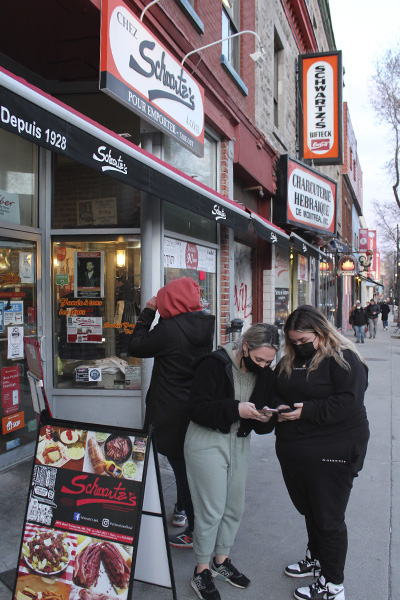
Schwartz’s Deli has long been a staple for tourists hungry to try a Montreal smoked meat sandwich. Photo by Marcus Bankuti.
Pavlopoulos sees services like his as part of a symbiotic ecosystem of local businesses that help shape the character of the city. He says it is important to him not to treat a neighbourhood like a zoo.
“Tourism can kill a neighbourhood if not done properly, but it can really help a neighbourhood if it’s done sustainably on a smaller and well-appreciated scale by locals and local businesses,” he says.
Pavlopoulos hopes tourists come back in time for him to continue to show off the city he loves.
“I think we help promote the city, and we help promote what was good about the city and not just take people to Schwartz’s and eat bagels and go see the Basilica,” he says.
